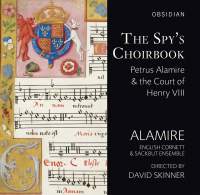Texte paru dans: / Appeared in: |
|
 |
Outil de traduction (Très approximatif) |
|
Reviewer:
David
Fallows Almost 50 choirbooks now survive from the copying workshop of Petrus Alamire, who happens to have been active as a political informer alongside his more upfront activities as a singer, composer and music copyist. The lovely choirbook in the British Library has Henry VIII’s coat of arms on the first motet, and David Skinner here proposes that it was a personal gift from Alamire to the king in about 1516 – though nobody has yet convincingly contradicted Honey Meconi’s carefully argued proposal (1998) that it was a diplomatic gift from Margaret of Austria at the end of Henry VIII’s French campaign of June to October 1513.
Either way, what we have here is a
complete recording of the entire choirbook in its manuscript order: 34
four-voice motets from the first decade of the century by French and
Franco-Flemish composers, giving a magnificent panorama of the repertory. Most
of them have never been recorded before. Most of the music is performed by the
mixed voices alone, a small group sounding gorgeous throughout. For a few
particularly grand motets they are joined by the wind players, who perform alone
in five of the pieces. But perhaps the main thrill is the sequence of five
settings of Dido’s last speech from the Aeneid, Dulces exuvie, by La Rue
(possibly), Agricola, Josquin, Mouton and Ghiselin, then immediately followed by
one of the most haunting motets of all time, Absalon fili mi, ascribed elsewhere
to Josquin but now widely believed to be by Pierre de la Rue. |
|
|
|
|
|
Cliquez l'un ou l'autre
bouton pour découvrir bien d'autres critiques de CD |
|




